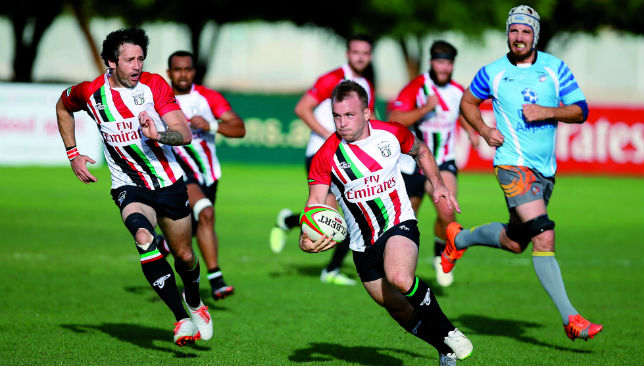
As incredible as it may sound, the UAE have a chance of appearing at the next Rugby World Cup in Japan in two year’s time. That chance may be about as remote as the very notion once held that rugby might thrive and flourish in the land of sand.
Yet, here the national team stands, on a three-game winning streak, and about to embark along a path that, however long, can lead all the way to the Land of the Rising Sun in 2019.
Stronger collectively and individually as they head to the Asia Rugby Championship (ARC) Division I series than they probably ever have been, and with a legend of two codes of the game overseeing their development and plotting their future success.
Apollo Perelini first mentioned the dream of striving to reach the 2019 RWC when he spoke with UAE journalists last summer. It wasn’t in a throw-away, empty sound bite. He spoke as if he believed it was a distinct possibility.
“Is it possible? Absolutely, yes. It’s achievable,” says the 47-yearold, his trademark beaming smile adorning his face. “I’m not shying away from it, I’m actually quite excited about it. Aim for the stars and if you hit the moon you’ll be fine. “It’s always a goal. As far as the UAE are concerned, we want to progress in the rankings, and the only way to do that is win games. The way to progress is win Division I, get a spot in the top three and hopefully have a shot at qualifying.”
It sounds magical, but there is of course a little fantasy to the dream. There are many complications ahead and those stars Perelini talks about will have to align almost perfectly if the UAE are to get there.
First of all they have to win the ARC’s Division I in Ipoh, Malaysia, which kicks off on May 14 – with the UAE competing against the hosts, as well as Sri Lanka and the Philippines. Victory there would earn them a place in the ARC top three competition for 2018 – contested currently between Japan, Hong Kong and South Korea.
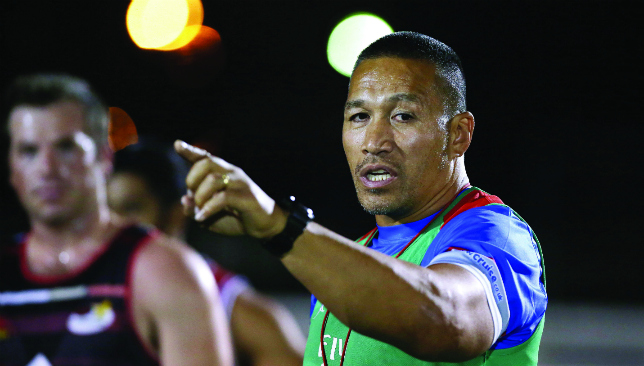
UAE Coach Apollo Perelini.
With Japan already qualified for RWC 2019 as hosts, the winner of next year’s ARC advances to an inter-continental play-off against an Oceanic qualifier – home and away – with the winner of that advancing to the final stage, the World Repechage.
This final phase of qualification, should the UAE make it that far, would pit them in a round-robin tournament against the last teams standing in Africa, the Americas and the loser of a Europe/Oceania play-off who would get another shot at qualifying. The winner of this exhausting process will qualify for Japan 2019.
“We want to win Division I so that we can challenge for the top three,” adds Perelini. “Win that and we’d go into a play-off probably against one of the Southern Hemisphere teams, from the Australasian competition. Win seven games as a national team and you could go to the World Cup. We’ve got the cohort of players. There’s good enough players.”
While the reality of the UAE featuring alongside rugby’s great nations like New Zealand, England and South Africa in Japan is scarce, the evidence is clear that rugby in the Emirates is getting stronger, with professionalism creeping ever nearer.
Another legend of rugby, former New Zealand league and England union international Henry Paul, is coaching Jebel Ali Dragons. Jacques Benade, who represented the Emerging Springboks and only missed out on full South Africa honours in large part because he had Joel Stransky, Jannie de Beer and Henry Honiball ahead of him, is in charge at Dubai Exiles.
These figures, the influx of quality players and the general rise in standards has seen club rugby develop at an impressive rate as well as assisted the national team gather momentum since arguably their darkest day as a fully-fledged nation three years ago.
In 2014 they lost a play-off to Singapore, their 30-13 loss at The Sevens on April 23 seeing them relegated to the ARC’s Division II, Asia’s third tier.
From that low point, however, it’s been a series of highs. Promotion back to Division I at the first attempt was denied by the width of a post as a missed conversion in 2015 saw the UAE beaten 20-19 by Malaysia – alongside victories against Thailand and Chinese Taipei – who went up instead.
Last year though, the UAE stormed into Division I – thrashing Uzbekistan 65-13 and Thailand 70- 18 – to win their first title, and set their longest winning streak.
“Last year was the first tournament we won, and the margin of victory against the two teams was an indication of where UAE rugby is at, at the moment,” adds Perelini. And Perelini feels the standard that coaching is reaching towards in the UAE is a major factor behind the rise of the national team.
“What’s helping in my job is the quality of coaching in the UAE,” he says. “My concerns and the concerns of Duncan (Hall, former Australia international and UAE’s first fulltime coach in 2012) over the years and Roelof (Kotze, Perelini’s predecessor) are it’s very hard to select a national team if the quality of coaching in the UAE Premiership is not as high.
“But these last two years it’s gone up a level and it’s making my job easier in the sense that you’re not having to upskill the players when you bring them in. “But it’s also making it a lot harder because more players are putting their hands up to play for the UAE. It’s giving me headaches of a different kind, but they’re good headaches to have.”
Despite the dark days, it has to be remembered that the UAE has only been a recognised rugby nation for seven years – forming their own governing body in 2010 following the break-up of the Arabian Gulf RFU. It became a fully-fledged member of the IRB (now World Rugby) only in 2012, so it’s understandable that progress was slow.
A record of just three wins in 19 games between 2010-14 is indicative of that. Since then, however, their record reads: Won 4, Lost 1. Progress has been rapid, and although the challenge of reaching RWC may be insurmountable, it’s one the current squad are fully committed to.
“It’s a long old road certainly, but with the team we have now along with a few others who qualify next season who knows what this side can achieve,” says Dubai Canes lock Daniel Perry, vice captain to Ben Bolger on this year’s tour. “Promotion achieved was the first goal and we don’t just want to compete this year but go on another level.”
“It’s a step at a time for me. We came a long way since 2015 and we just need to keep building and going forward,” adds Abu Dhabi Saracens’ bullocking South African Number 8, Jaen Botes.
“We still have a lot to achieve, still a lot of potential as a squad and federation. I’m sure this will give everyone that extra bit of drive to go forward. I look forward to the hard work and to compete in the division we should’ve been in last year. Full steam ahead.”
In Ipoh the UAE play Malaysia on May 14, Sri Lanka on May 17 and the Philippines on May 20.

UAE RUGBY TIMELINE
1993-2010
The Arabian Gulf was a combined team of players from Arab states of the Persian Gulf including Bahrain, Kuwait, Oman, Qatar, Saudi Arabia and the UAE. The team was governed by the Arabian Gulf Rugby Football Union (AGRFU).
They play their first international on July 3, 1993, losing 64-20 to Namibia. Their biggest win came in a one-sided 97-3 mauling of India on April 27, 2001, and their biggest defeat when they are thrashed 114-6 by Japan on May 3, 2008.
The Arabian Gulf participated mainly in friendlies until entering the inaugural 2008 Asian Five Nations alongside South Korea, Japan, Hong Kong and Kazakhstan. After losing all four matches and finishing last, the team was relegated to Division I. They won Division I in 2009, securing promotion back to the Asian Five Nations.
On January 16, 2009, the International Rugby Board (IRB) announces that the AGRFU would be split into separate national unions and would cease to exist by the end of 2010. The first new union to be formed was the UAE Rugby Federation, which became a full IRB member in November 2012 – the governing body’s 100th nation.
The Arabian Gulf’s last game is a 21-19 win over Korea on May 14, 2010 at the 2010 Asian Five Nations.
2010-14
Over the next four years, the UAE make little headway as a stand alone nation – losing 16 of their 19 competi – tive fixtures: two wins came in the 2011 and 2012 Asian Five Nations v Kaza – khstan and a draw with Sri Lanka.
Finishing bottom of the 2013 Asian Five Nations sees them drop into Division I.
The following year they lose a play – off, 30-13 to Singapore, to drop into Division II and Asia’s third tier.
2015
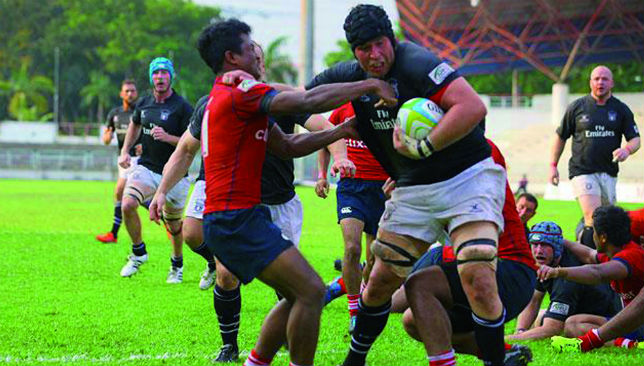
In May, the UAE taste victory for the first time in three years as they beat Chinese Taipei and Thailand in the revamped Asia Rugby Championship series, Division II, but they narrowly miss out on promotion back to Division I as hosts Malaysia advance following a 20-19 win.
After rugby performance manager Roelof Kotze departs for a job back in his native South Africa in October, former dual code Samoa star Apollo Perelini comes on board to replace him.
2016
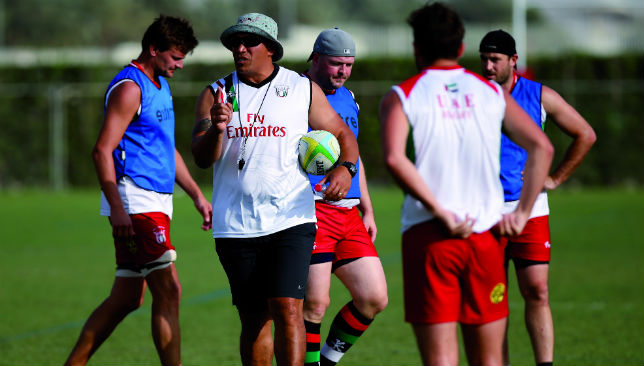
In Perelini’s first tournament in charge, the UAE thrash Uzbekistan 65- 13 and Thailand 70-18 to earn promotion back to Division I and put together successive victories for the first time in their history.
2017
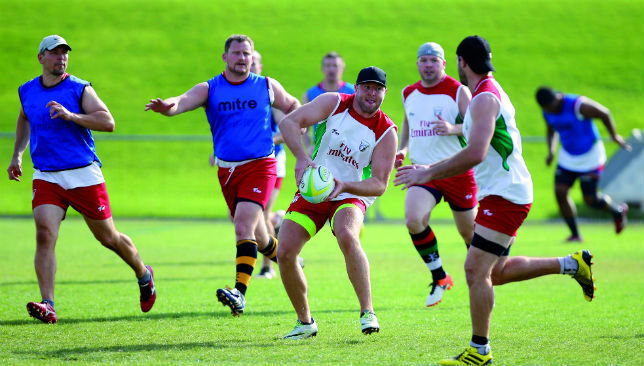
The UAE will head to Malaysia in May for a chance to earn promotion back to Asia Rugby’s top tier for the first time in four years and an unlikely shot at qualifying for the 2019 Rugby World Cup in Japan.